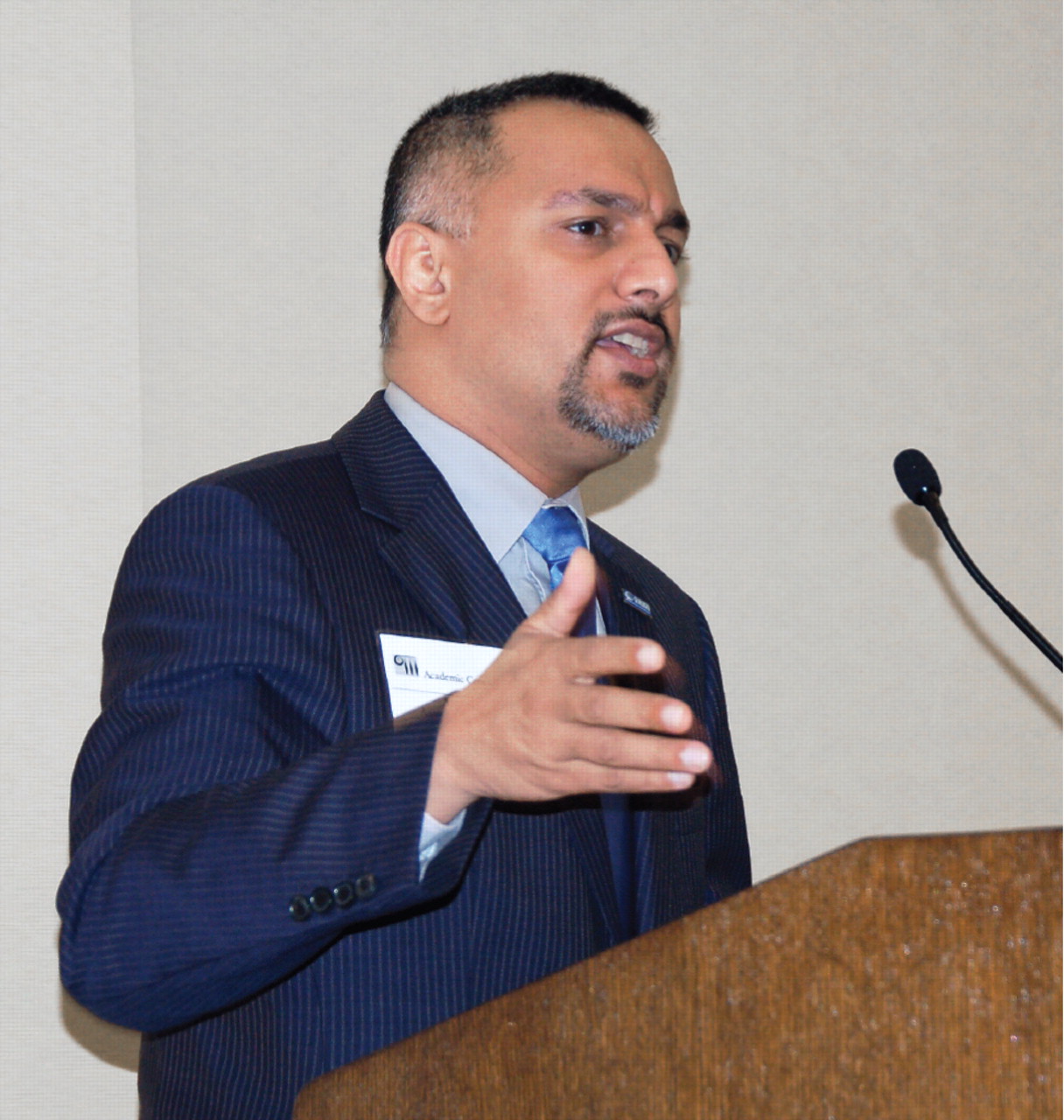Consortium Tells Congress Why It's Crucial to Boost MH Funds

Anand Pandya, M.D., director of Ambulatory and Community Psychiatry at Bellevue Hospital and president of the National Alliance on Mental Illness, tells Academic Consortium attendees that their lobbying of Congress was needed not only to support psychiatric researchers but also the “many families and kids who need help.”
Credit: Rich Daly
Psychiatric illness researchers gathered in Washington, D.C., in mid-March to celebrate the recent one-time boost in federal funding for mental illness research and to urge Congress to support the long-term study of the causes of and cures for these life-threatening conditions.
APA's annual Academic Consortium event brings researchers to Washington to lobby Congress on funding for mental illness research. Although 2009 attendance was lower than in previous years, attendees were passionate about the need for ongoing federal support of psychiatric conditions that threaten and shorten the lives of millions of Americans.
“Research matters, and it saves lives,” APA President Nada Stotland, M.D., told attendees. “We need research to find out what may be impinging on our patients and not allowing them to have a normal length of life.”
The life-shortening aspect of serious mental illness and the way it can greatly decrease quality of life were highlighted in the startling 2004 finding by the World Health Organization that mental disorders among U.S. residents accounted for 25 percent of healthy years lost to disability and death. Other recent troubling trends included the inability to significantly reduce the approximately 30,000 suicides that occur nationally every year, as well as the recent spike in suicides by military personnel, presenters said.
During the gathering, the attendees also celebrated the inclusion of a substantial boost in federal funding for mental health studies within the stimulus law. The American Recovery and Reinvestment Act of 2009 (ARRA, PL 111-5), signed by President Barack Obama on February 17, included a 34 percent boost in funding for the National Institutes of Health—from $29 billion to $39 billion. The allocation of ARRA funds over two years will direct about $1 billion in total to the National Institute on Drug Abuse (NIDA), National Institute on Alcohol Abuse and Alcoholism (NIAAA), and National Institute of Mental Health (NIMH).
In addition to thanking members of Congress for the additional funds, attendees sought to educate them about how much more work is needed to understand mental illness. They noted that long-term research support is the only way that continuing breakthroughs in psychiatric care and eventual cures for mental illness will be found.
“Research is not like a bridge. It's a pipeline of people, and when resources go [away], then people go on to other areas of work,” said Anand Pandya, M.D., director of Ambulatory and Community Psychiatry at Bellevue Hospital and president of the National Alliance on Mental Illness.“ We need to say 'thanks' and that this work needs to continue.”

Jeffrey Lieberman, M.D., chair of APA's Council on Research, tells attendees at the 2009 Academic Consortium event that he is grateful for additional federal research funding provided through the stimulus law. However, continued lobbying by psychiatrists is needed to keep the NIH budget from “falling off a cliff” after stimulus funds are spent, he said.
Credit: Rich Daly
The recent boost in funding followed four years of “erosion” in federal support of mental illness research, during which time there were cuts or relatively small increases that failed to keep up with inflation, according to Julio Abreu, president of the Coalition for Health Funding. And despite the new infusion of money, the stimulus boost left out other areas of federal mental health support, including the Substance Abuse and Mental Health Services Administration (SAMHSA), which received no funds under ARRA.
Past NIH-funded research has transformed the nation's understanding of mental illness from a so-called character flaw to the result of genetic, developmental, and/or social factors generally beyond the control of people who have such an illness. Recent research initiatives, such as the Clinical Antipsychotic Trials of Intervention Effectiveness (CATIE) and treatment alternatives for treatment-resistant depression, have shown that federally funded research can have an impact on clinical practice. Among the areas, for example, in which further work is needed, said Darrel Regier, M.D., M.P.H., director of APA's Office of Research and of the American Psychiatric Institute for Research and Education, is on the psychosocial aspects of the development of psychiatric disorders.
Among the new research initiatives planned by NIMH, NIAAA, and NIDA are those that explore the use of genetic data and the refinement of a broad range of noninvasive neuroimaging techniques.
Regier said genetic-based research will lead to “personalized medicine” and allow psychiatrists to know which patients will benefit from specific medications.
APA and other mental health advocates have requested a 7 percent, or $2 billion, increase in NIH's budget for Fiscal 2010, which would provide $208.5 million more for NIMH, NIAAA, and NIDA.
The requested increase for mental health research may face “lukewarm support” in Congress, however, as its arrival coincides with the larger national health care reform push that legislators are undertaking, according to Stotland. So researchers and other advocates need to continually highlight the importance of this type of research.
“It is not the time to be shy about how important it is to keep that funding,” Stotland said.
Information on NIH research funding available under the stimulus law is posted at<http://grants.nih.gov/grants/funding/challenge_award>.▪



